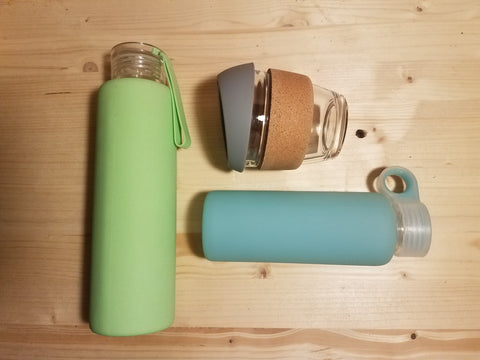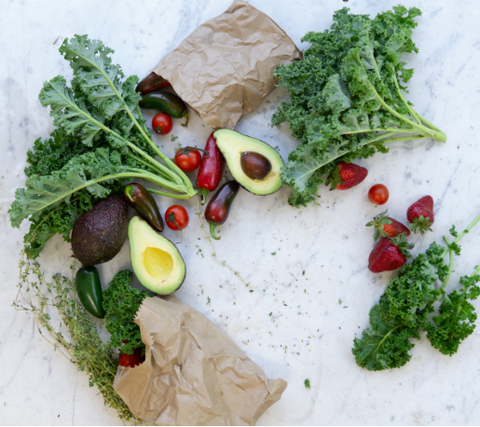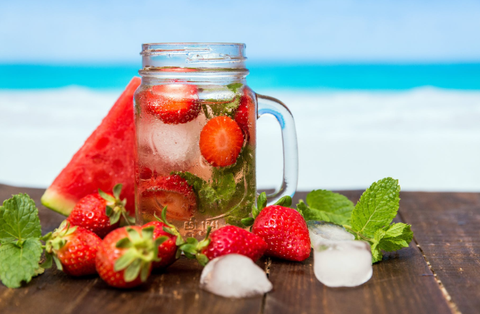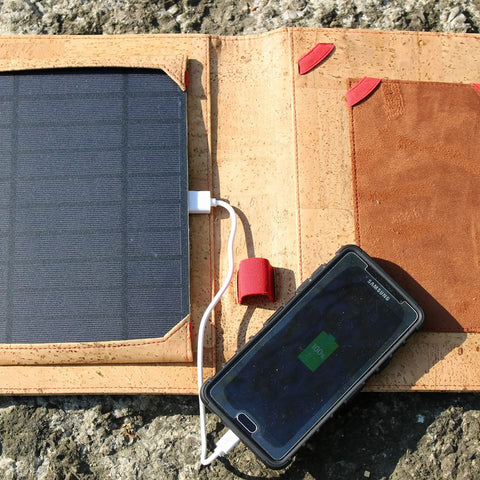Read time: 8 minutes
For many of us, spending time in the sun, diving into the ocean, and feeling a fresh breeze on our face is the idea of ultimate summer relaxation. Summer is a favorite time of year for spending time outdoors and taking long-awaited vacations.
But, without preserving a stable climate and a healthy environment, these small summer joys that we look forward to could become more difficult to come by. Being outdoors and immersing ourselves in nature, we often feel more connected to our natural world and we start to care more to protect it. We hope that respecting the environment now will mean that the next generations can experience the same natural wonders of our vibrant planet that we are so fortunate to witness today.
So, we thought that we would take a few minutes to talk about some basic summer sustainability tips to help keep your carbon footprint to a minimum and your peace of mind to the maximum this season.
Here you go, have a read of our list of top summer sustainability tips!

1. Keep your home or apartment cool without air conditioning: Although it may seem easy enough to just switch on an air-conditioning unit, air conditioning units are heavy hitting on the planet. Instead, practice opening windows at night to let in the fresh air, and closing the windows first thing in the morning when the sun comes out. Closing the curtains will also help to keep your house from getting too hot, especially when the sun is very bright or shining directly into the windows. If you have ceiling fans, use them making sure that the blades are facing down in "summer" mode to circulate and cool the air in a room. If you have windows that allow for cross-ventilation, open the windows when the sun goes down and let the cool air circulate.

Photo Credit: Not Perfect Linen / Instagram
2. Wear clothes made from lightweight, natural materials: Clothes made from lightweight, natural materials such as linen, lyocell-Tencel, hemp, and organic cotton are ideal for all seasons, and especially suited for the summer. These materials are made from plant fiber and are known to be able to "breathe," or let small amounts of air pass through. They also dry very quickly and are best washed in cold water. Unlike these natural fabrics, polyester and other petroleum-derived fibers do not allow air to pass through the material and can make your skin feel like it is being cooked underneath your clothing. These materials also retain odors and release micro-plastics when washed.

3. Wash with cold water and dry clothes outdoors in the sun: As mentioned above, a plus to wearing clothing made from natural fabrics is its ability to be cleaned in a way that uses very little energy. Unless you have extremely dirty laundry, we recommend running the washing machine at either 30 or 40 degrees (cold water) for all types of washes, especially when washing clothes made from natural fibers. This is an easy way to use less electric energy from heating water in your washing machine. While on the topic of laundry, let's just say that air conditioning units and clothes dryers can hang out together in the category of "majorly polluting appliances." In our opinion, the clothes dryer is an incredibly unnecessary machine. In Europe, they are practically non-existent in homes. Especially during the summer, there is no reason to rack up the CO2 by running an in-home clothes dryer instead of simply hanging clothes on outdoor hanging clotheslines or a clothes-rack to dry. If you use a foldable clothes-rack as we do, place it outdoors in a shady area out of direct sunlight to speed up the drying process. If you frequently dry your clothes outdoors, you may want to turn your clothes inside out to prevent the sun from bleaching your colored clothing.

4. Avoid toxic sunscreens and mosquito repellent: If you choose to wear sunscreen or use a spray to ward off mosquitoes and other insects, do your research first. Many sunscreens contain questionable chemicals such as oxybenzone, which are considered toxic to our bodies (with concern regarding absorption through the skin and hormone disruption) as well as toxic to marine life and coral. Even if you are not directly entering the water with these chemicals applied to your skin, they can still enter the waterway when you take a shower. The best resource to find out more about how to choose a health-supporting and eco-friendly sunscreen is the Environmental Working Group's Guide to Sunscreens. We agree with the EWG that sunscreen should be viewed as a "last resort" for protection from the sun, and instead, we should cover up by wearing hats and lightweight clothing, and plan time in the sun when it is lower in the sky in the early morning and late afternoon.
Mosquito repellent usually contains a neurotoxic chemical called DEET that is, for all intents and purposes, a pesticide that functions very similarly to other organophosphate pesticide chemicals. While the jury is still out over the risk to benefit ratio regarding DEET, it is not recommended for use in concentrations over 30%. We recommend trying out safer, plant-based options using diluted essential oils to keep insects away.

5. Travel Light: When traveling, keep your carbon footprint in mind. It may not always be possible to avoid air travel when traveling abroad, but if you can arrive by ground transportation to your destination, opt for the train or car. The train is the least polluting way to travel, followed by the car, and last, the airplane. Riding the train and other public transportation is always one of the most environmentally-friendly options, as you are simply riding in a means that is already going to your destination.
Also, minimalism regarding your luggage is key to traveling sustainably, as baggage adds weight to your car or other means of transport, and therefore increases fuel usage. Packing light is not only better for the environment in this sense, but it also helps relieve the stress of traveling with heavy bags and will allow for greater mobility and peace of mind on your journey.

6. Carry Reusable Items: By now it is no secret that the ocean is in desperate need of our love and attention. Whether going on a day-outing or a longer vacation, reusable items deserve a place in your bag or suitcase. To lessen our environmental impact, reducing our everyday use of single-use plastic is key. Although it may require a bit of extra thought and preparation, it is easy and rewarding to carry and use reusable items such as water bottles, coffee cups, bamboo/metal silverware and straws, containers, and shopping bags. Although it may seem like a hassle at first, you will be glad to have a reusable bottle and bag on hand should you come across a water fountain while you are out, or need to make an unexpected grocery run. Not only will this small preparation save on plastic, but it will also save you money in the long run, as filling up a water bottle is free, but single-use bottles cost at least a couple of dollars. Often, stores will give a slight discount for bringing a reusable bag, and coffee shops will give a small discount for bringing a mug from home.

7. Eat more vegetables: Following a vegan or vegetarian diet is especially suited for warm, summer weather. Whereas in the winter, you might have an urge for heavier foods, summer is perfect for eating light but satisfying plant-based meals. Eating fruits and vegetables with high water content as well as a high vitamin and mineral content is essential for keeping your energy up on hot days. Animal products can feel like they are weighing you down, especially during the summer.

8. Stay hydrated without waste: Drinking enough water is always important for our physical health and well-being, and it is even more vital to stay hydrated with increased sun exposure and warmer temperatures. Drinking cold beverages such as water with ice, iced tea, lemonade, fruit-infused water, or freshly made juice and smoothies can not only keep you feeling more comfortable, but it can reduce the need to use electric fans and air conditioners. To refer back to point 6, remember to use glass or stainless steel bottles to store your drinks on the go rather than buying pre-made drinks packaged in plastic single-use containers.

9. Leave no trace: To return briefly to the topic of travel, remember not only to travel with minimal luggage but to cause no harm to the place where you are visiting on vacation. Leave your destination of choice better than you found it by not creating waste, littering, or using personal care products that may be harmful to local water systems, especially if traveling to a vulnerable area such as a nature reserve or a camping ground.

10. Unplug: Whether speaking from a sustainability standpoint or a mental clarity (or even sanity) standpoint, unplugging from your devices seems almost intuitive during the summer. Yes, many of us use computers and social media as part of our jobs, and it is often hard to unplug completely because our work is dependent on technology and our online presence. But, during these months when outdoor adventure calls, sometimes taking a break, engaging in exercise or other activity, and meditating in nature can improve your productivity once you do return to your normal flow. Unplugging can also refer to all electronic devices and indoor lighting. Turn off the tech, turn off the lights, and spend time frequenting local parks, nature reserves, beaches, mountain hiking trails - whatever speaks to you. You will be reducing the electrical energy you use, and increasing your own physical and mental energy all at the same time.

11. Appreciate the sun: Often we hear about sun exposure in a negative light. But, let's not forget that we are in essence "house-plants with more complicated feelings," to quote a phrase I've heard popularized lately. We may not rely on photosynthesis to create glucose like plants, but we do rely on the sun to naturally produce vitamin D, as well as keeping bad microbes at bay on our skin and in our bodies. Not to get too serious, but without the sun, life on earth would cease to exist entirely. So get out in the sun for at least a couple of hours each day during the summer (preferably during the early day and later afternoon) to fully appreciate the beauty of this active season.
On another note, take advantage of the sun's energy instead of using electricity. As mentioned before in point 3, drying clothes in the sun is one of the best methods for maintaining the freshness and longevity of your clothes and a great way to cut back on energy usage, if you are accustomed to using a clothes dryer. Also, use the sun to charge your electronic devices with solar panel chargers. This is a great way to stay connected without using electric energy from the grid that likely is obtained by fossil fuel sources. The sun is your ally, especially during the summer!

Solar Panel Charger at HowCork by Grow From Nature
--
Whether you are vacationing, working, taking it slow or kicking your ideas into gear, we hope that you have a relaxing and fulfilling summer season. With these tips in mind, make this your most sustainable summer yet, and experience the joy of mindful clarity while soaking up the warm weather.
.
.
.
Sources cited in article:
https://www.ewg.org/sunscreen/
https://www.ewg.org/sunscreen/report/the-trouble-with-sunscreen-chemicals/
https://www.sciencedaily.com/releases/2009/08/090804193230.htm


